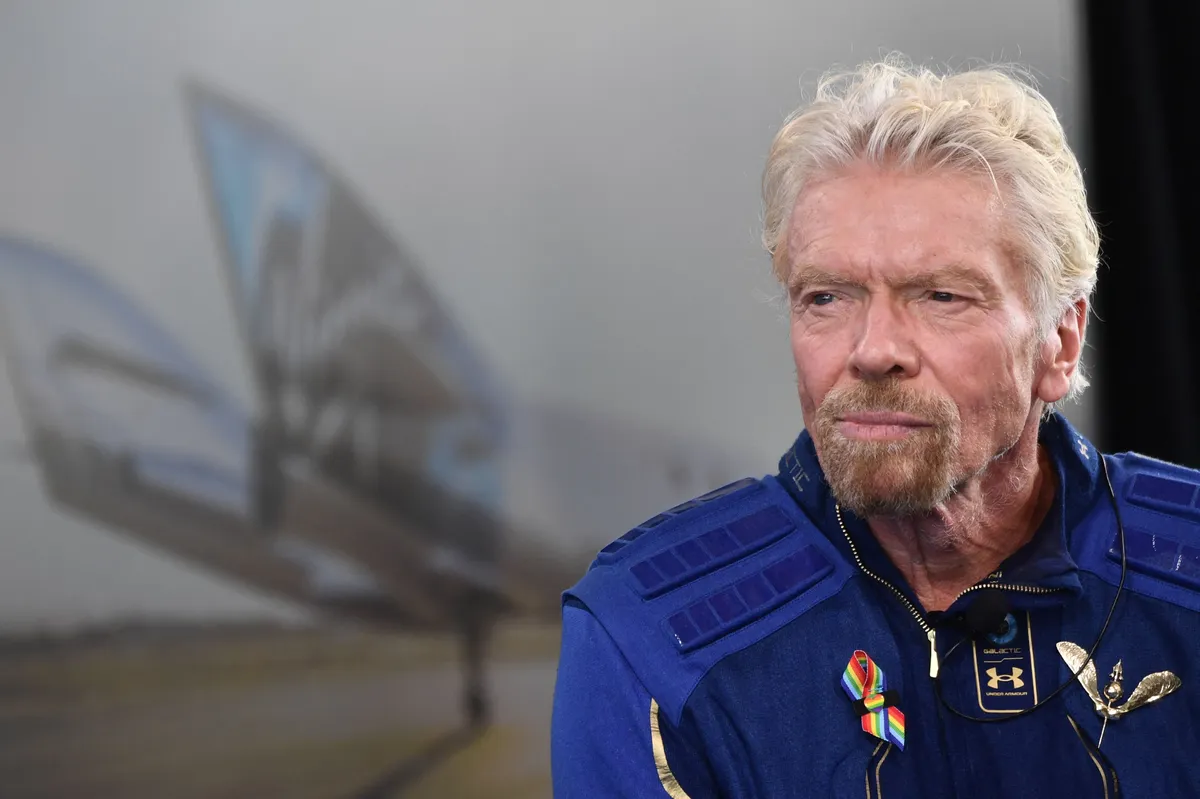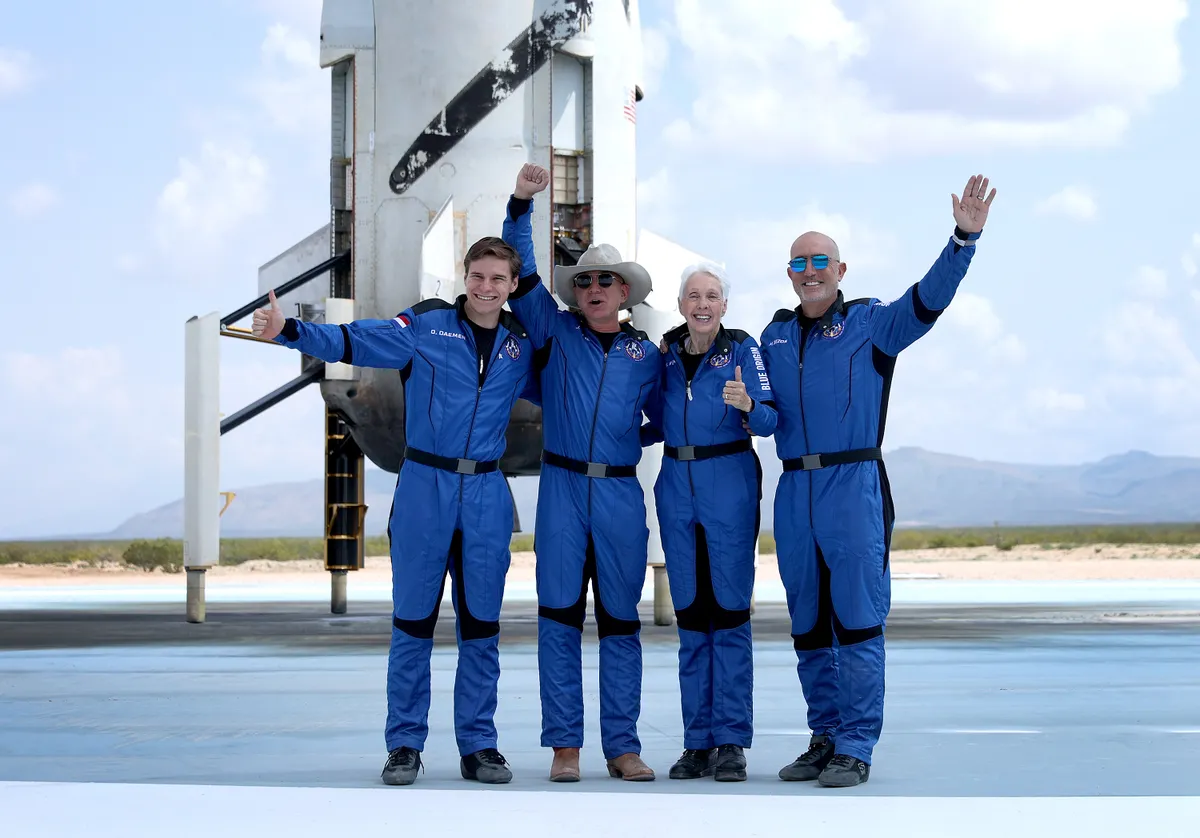Space travel made international headlines in July as both Amazon founder Jeff Bezos and Virgin boss Richard Branson flew to space in crafts made by their own companies. Not to be outdone, Elon Musk's SpaceX plans to launch an all-civilian crew into orbit in September.
Commercial space travel is clearly firing up, and is predicted to become big business. Branson's Virgin Galactic plans to begin regular commercial services in 2022, and already has 600 reservations at around $250,000 a ticket. According to a recent analysis from Swiss finance firm UBS, the space tourism industry will be worth $4bn by 2030.
After landing from his sub-orbital flight to the edge of space, Bezos said the experience had reinforced his commitment to fighting climate change. But one crucial question about this fast-moving sector is what impact it could have on the environment itself?

Rockets burn through huge amounts of propellants to take off. But there are a variety of ways to launch rockets into space, so understanding the exact impacts of each craft is not always straightforward.
“With all space travel, including space tourism, the environmental impacts depend on a variety of factors that are specific to the mission,” said Dr Simit Raval, a senior lecturer at the University of New South Wales and co-author of a recent analysis on space launch emissions. More research is needed to ensure a “robust understanding” of these impacts, he says.
Arguably, the two most important environmental impacts of space travel are its contribution to global warming and stratospheric ozone loss, says Raval.
Read more about space exploration:
- The next giant leaps: The UK missions getting us to the Moon
- Move over, Mars: why we should look further afield for future human colonies
- 6 out-of-this-world experiments recreating space on Earth
According to one estimate by Dr Eloise Marais at University College London, carbon dioxide emissions for the four or so tourists on a space flight will be up to 100 times more than the emissions per passenger of a long-haul flight -- already an extremely carbon intensive activity.
According to a study carried out by researchers at UNSW, Sydney, alumina particles, black carbon and even water vapour released into the stratosphere are further causes for concern when it comes to global warming. However, the overall impact is complex as some of these emissions, such as soot, can also have a cooling effect.
Paul Peeters, an associate professor in sustainable transport and tourism at Breda University of Applied Sciences in the Netherlands, says that impacts could soon add up if space tourism becomes more common. “Launches into space each have significant ecological footprints per launch,” he says.
When it comes to climate change, much depends on the propellant, says Peeters. For example, hybrid rocket engines, a relatively new addition to the space industry which was used on Virgin Galactic’s SpaceShipTwo, run on both solid and liquid fuel and release far more black carbon than kerosene fuel. “If hybrid rockets, which are assumed to be relatively cheap to operate, become popular, a climate disaster is looming,” says Peeters.
Additional carbon emissions could also come from building the Earth spaceports and the space tourists flying to launch sites, possibly using private jets, says Annette Toivonen, tourism lecturer at Haaga-Helia University of Applied Sciences in Finland.
Read more about leaving Earth:
- How to build a Moon base
- The plans to build a Martian mega city you’d actually want to travel 300 million km to live in
- How humanity will return to the Moon: The future of lunar exploration
Alongside the climate impact, rocket launch exhaust plumes contain other substances which can deplete the Earth’s ozone layer such as nitrogen oxides, hydroxyl radicals and water. Emissions from space launches are not yet specifically addressed in the international Montreal Protocol, which addresses substances that deplete the ozone layer.
“This may be something that is re-addressed as space launches become more frequent,” says Raval.
There can also be local pollution impacts at launch sites. For example, the long term use of unsymmetrical dimethylhydrazine (UDMH) rocket propellant at the Baikonur Cosmodrome spaceport in Kazakhstan led to severe environmental damage.
There are currently no global regulations or agreements regarding the pollution or other environmental impacts from space travel.
“The current rise in private new space activities has created an increased demand to avoid a ‘Wild West’ attitude and ownership,” says Toivonen. New types of regulations and legislative frameworks are needed, she says, including globally binding space tourism legislation.
The US billionaires pushing space tourism argue that they offer hope and even future positive consequences for people around the world. Bezos has argued that space travel will help children "build a future", while Branson has said that private space travel will be "open to everyone".

Private space launches have certainly piques the interest of many people. An analysis by Media Matters for America found that broadcast morning television in the US spent nearly as much time on the July Bezos space launch in one day as on the entire climate crisis in the whole of 2020. However, Evlondo Cooper, senior writer for Media Matters, says Bezos’ space flight was a missed opportunity to cover both issues.
“Space exploration is exciting; but the undue attention given to those who can leave our planet too often ignores all of us who will be left behind to suffer the consequences of an overheated Earth driven by our world’s polluting industries,” he says.
Bezos has even argued that “all polluting industry” should be moved into space to keep Earth clean. But transporting heavy industry into space and the products back to earth would require massive use of earthly energy and resources.
“There are no quantitative scenarios showing that it is possible by any margin of likelihood,” said Peeters.
While space travel will have the potential to become more energy-efficient or to switch to less-pollutant propellants, it will still add to the environmental pressure on earth without adding to the quality of human life on Earth, argues Peeters.
The best decision, he says, would be to agree internationally that commercial space travel is “not a wise development” due to the current ongoing environmental and health crises.
About our experts
Dr Simit Raval is a senior lecturer in engineering at the University of New South Wales. He specialises in using remote sensing technology to assess the environmental impact of mining.
Prof Paul Peeters is a Professor of Sustainable Transport and Tourism at Breda University of Applied Sciences. He specialises in the environmental impacts of tourism and transport and climate change mitigation.
Annette Toivonen is a lecturer in space tourism based at the Haaga-Helia University of Applied Sciences in Finland. She specialises in space travel and sustainability.
